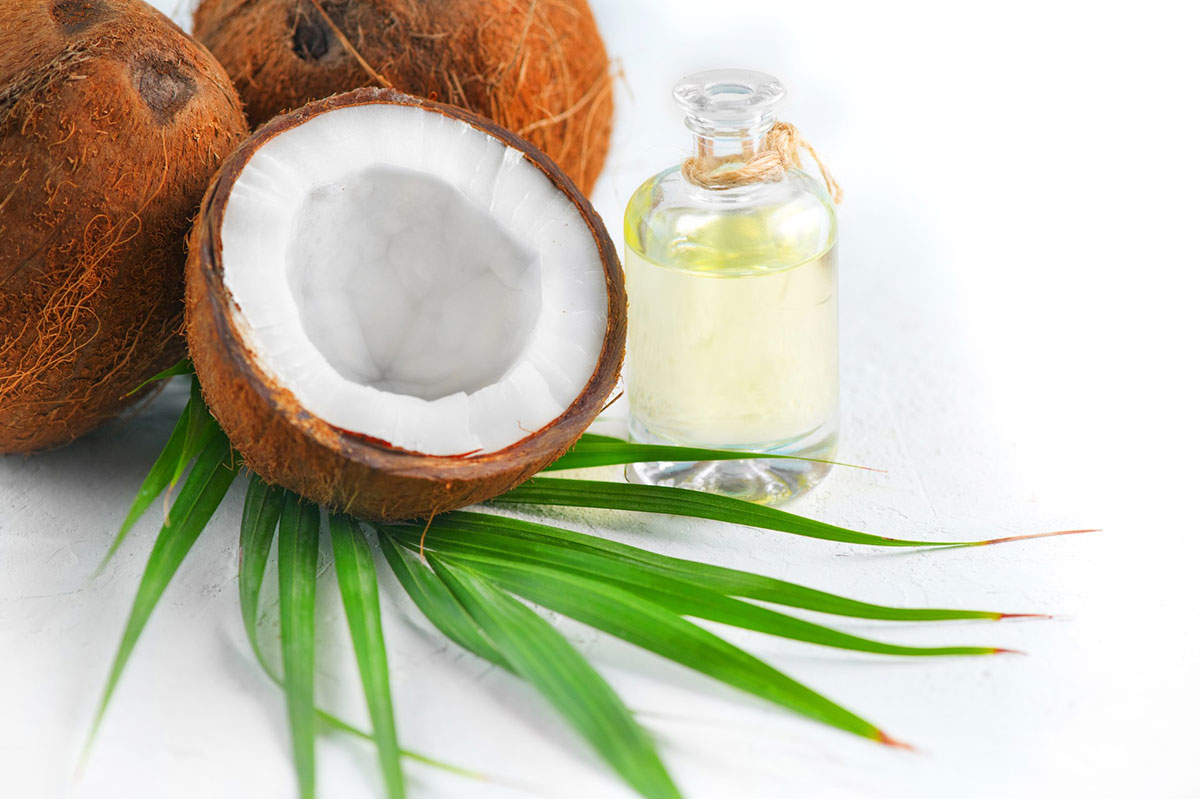Get a Free box of Gummies ($120 value) when you spend $200 or more. Now through Monday

If you are looking to learn more about the benefits of using coconut oil and why it hasbecome such a popular household oil then you may certainly appreciate gaining insight into the types and some ofthe potential benefits of this tropical oil.
The use of coconut oil has really gained popularity among the many dietary oils secondaryto its unique nutritional profile and versatile use. It has been used in cooking and baking to being used as aningredient in cosmetic products as well as hair and skin products.
Though there is continued research regarding coconut oil and its potential role inpromoting health benefits, not all claims are scientifically supported, and thus this post will focus onevidence-based findings.
There are so many varieties of coconut in the marketplace, so knowing what type of coconutoil you should be looking for can be super helpful. Coconut oil is categorized into many types, but we willreview three main types below.
Like most of us when you reach for organic and organic food product to purchase you havethat sense of security —that sense of trust. Organic coconut oil is theperfect example of an edible oil that has met the stringent standards to deem it 100% Certified Organic. Thisensures us as consumers that this is a healthy choice devoid of pesticides used in farming, and also assures usthat there were no chemicals used in processing or extracting the oil from the coconut. You can taste and smellthe robust tropical coconut in this organic oil.
So, feel great about choosing 100% Certified Organic coconut oil for you and your lovedones — including your precious little fur babies.
Virgin coconut oil (VCO) is one of the preferred varieties of coconut oils. This oil ismade by cold pressing the edible white fleshy part of the coconut also known as the coconut meat.1
The benefits of this process are that it does not use any unhealthy extraction methods orsolvents, nor does it use any extreme temperatures.
The oil is extracted by cold pressing the flesh thereby not degrading the integrity of thenutritional values, especially its <ahref=”https://shopc60.com/blogs/news/what-are-antioxidants-and-why-are-they-essential-for-your-health”>antioxidants.1
VCO does retain its delectable taste and natural coconut aroma.
Refined coconut oil is also referred to as refined, bleached, and deodorized (RBD). Thisoil is made from dried coconut meat, called copra, and is pressed through a machine using steam or heat. Thisdeodorizes the product.2
The oil then goes through a bleaching process (no bleach used just the name of the method),to remove impurities, including bacteria.2,3
RCO has a neutral scent and taste compared to VCO. Refined coconut oil does have a highersmoke point compared to refined coconut oil; therefore it is better for cooking at a higher temperature.
It is possible that many people may wonder what the difference between MCT coconut oil andwhole coconut oil is, and honestly that is a great question.
First, let’s tackle this acronym. MCT stands for medium-chain triglycerides or fatsthat are found in coconut oil. The benefits of MCT oil is that it is more easily broken down and more readilyabsorbed by the body than long-chain fatty triglycerides.
MCT coconut oil for example, boasts of a unique composition because it contains100% <ahref=”https://shopc60.com/blogs/news/exploring-the-health-benefits-of-mct-oil”>MCT oilwhich provides a concentrated source of <ahref=”https://shopc60.com/blogs/news/harnessing-natural-energy-boosters-for-optimal-performance”>energy andprovides a sense of satiety.
Many people, like athletes or super savvy, health-conscious individuals use MCT coconut oilto power charge their beverages such as smoothies or even coffee to get their day started. Also, some may add itto their meals or beverages rather than adding refined carbohydrates like sugar to their diet!
While whole coconut oil also contains MCT oil, it doesn’t provide nearly as much asMCT coconut oil. Whole coconut oil provides approximately 50% or so of MCT oils, meaning the body still has somework to do with digesting and absorbing the other half.
Just keep in mind that moderation is important and variety in your food intake is key toensure you are obtaining essential nutrients, including a varied amount of fatty acids.
Coconut oil is a plant-based fat; however, it is made up of about 80-90% of saturated fattyacids (SFAs). The saturated fatty acids include lauric acid, which is the predominant fat, making up about 50%of the fat profile.4
As noted, coconut oil contains lauric acid as part of its fatty acid profile. Lauric acidis a unique source of medium-chain (MCT) fatty acids. As you may have read, MCTs are easily absorbed andutilized by the body (really the liver) and then used by the body as an energy source.4
Lauric acid also is known to have antimicrobial activity which may help support theanti-inflammatory nature of the immune response in the human body.5
Though coconut oil is often added to numerous dishes to lend to a smooth and decadent tasteand mouth feel, because it is a saturated dietary fat, it is recommended that it is used in moderation.
When looking to add fats with a nutritional profile that is more heart health-friendly,consider the use of <ahref=”https://shopc60.com/blogs/news/reap-the-benefits-of-avocado-oil”>organic avocado oil or organic extra virgin oil as a substitute. Keeping inmind that according to the recommendations set forth by the Dietary Guidelinesfor Americans, 2020-2025, saturated fat in our diet should be less than 10 percent of calories perday.6
Many people use coconut oil on their hair since it naturally provides moisture andfunctions as a natural moisturizer or conditioner.
Interestingly, it has been noted that coconut oil’s natural chemical structure helpsto protect hair because the oil contains medium-chain triglycerides —lauric acid. Lauric acid allows thecoconut oil to be easily absorbed into the hair shaft.7
Lauric acid may also help to support a healthy scalp and decrease the chances of flakyscalp or dandruff because it has antimicrobial properties.7
Regarding the topical use of coconut oil on skin, in addition to providing hydration, itmay support healthy skin by decreasing inflammation, however, it is always best to speak with your healthcareprovider if you have skin concerns.8
It is amazing that you can use what nature provides for your hair and skin without worryingabout what is on the label that you cannot pronounce. The beauty is using an oil like unrefined coconut oilguarantees what nature promises —is provided!
Consider using unrefined coconut oil because it is less processed and may be a good choicesince this oil may be better tolerated for your skin and gentler on your hair.
Have you ever heard of oil pulling? This is a process in which coconut oil is used to cleanthe oral cavity from bacteria by swishing it in your mouth for about 15 minutes. In conjunction with regularbrushing with fluoridated toothpaste and flossing, oil pulling is thought to be a beneficial way to decreaseharmful bacteria that could potentially lead to tooth decay and bad breath.8,9
According to research, coconut oil is a safe alternative to chlorhexidine, an ingredient insome commercial mouthwashes.9
Before considering using coconut oil either topically or if looking to add it to your diet,it would be best to discuss use with your healthcare practitioner to ensure it would be best for your specificneeds.
Though the proposed benefits of using coconut oil are tremendous, there is ongoing researchto substantiate the various benefit claims that are being made to ensure credibility and safety.
These statements have not been evaluated by the Food and Drug Administration. Theseproducts are not intended to diagnose, treat, cure, mitigate, or prevent any disease. Individual results mayvary. The information provided in this blog is for educational and informational purposes only and should not beconstrued as medical advice.

Ken Swartz, MS is the co-founder, Chairman Emeritus, and former Chief Science Officer at
C60 Power, a health and wellness company committed to delivering the highest quality Carbon 60 products available.
Ken earned a Master of Science degree from the University of Colorado at Denver and a Bachelor of Science in
Economics from Arizona State University.’
References